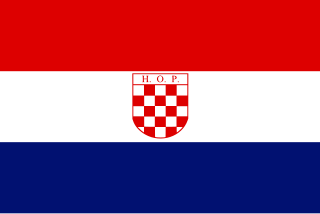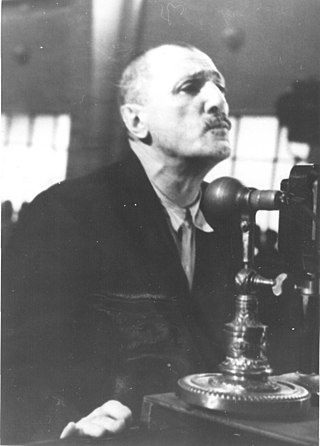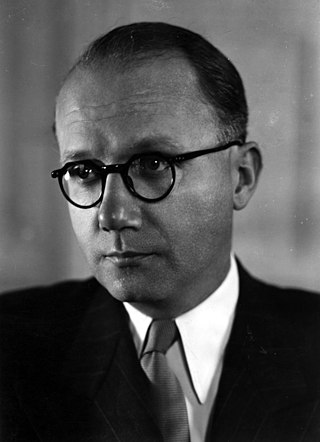This list has no precise inclusion criteria as described in the Manual of Style for standalone lists.(May 2012) |
This is a list of people who led the military and politics of the Independent State of Croatia.
This list has no precise inclusion criteria as described in the Manual of Style for standalone lists.(May 2012) |
This is a list of people who led the military and politics of the Independent State of Croatia.

Ante Pavelić was a Croatian politician who founded and headed the fascist ultranationalist organization known as the Ustaše in 1929 and was dictator of the Independent State of Croatia (NDH), a fascist puppet state built out of parts of occupied Yugoslavia by the authorities of Nazi Germany and Fascist Italy, from 1941 to 1945. Pavelić and the Ustaše persecuted many racial minorities and political opponents in the NDH during the war, including Serbs, Jews, Romani, and anti-fascists, becoming one of the key figures of the genocide of Serbs, the Porajmos and the Holocaust in the NDH.

The Independent State of Croatia was a World War II-era puppet state of Nazi Germany and Fascist Italy. It was established in parts of occupied Yugoslavia on 10 April 1941, after the invasion by the Axis powers. Its territory consisted of most of modern-day Croatia and Bosnia and Herzegovina, as well as some parts of modern-day Serbia and Slovenia, but also excluded many Croat-populated areas in Dalmatia, Istria, and Međimurje regions.

Vjekoslav Luburić was a Croatian Ustaše official who headed the system of concentration camps in the Independent State of Croatia (NDH) during much of World War II. Luburić also personally oversaw and spearheaded the contemporaneous genocides of Serbs, Jews and Roma in the NDH.

Lorković–Vokić plot was a mid-1944 attempt initiated by Interior Minister Mladen Lorković and Armed Forces Minister Ante Vokić to form a coalition government with the Croatian Peasant Party (HSS), abandon the Axis powers and align the Independent State of Croatia with the Allies with the help of the Croatian Home Guard. The plot originated from the HSS, which was also involved in the negotiations with the Allies. The plot ended with mass arrests and the execution of the major plotters, including Lorković and Vokić.

The Croatian Liberation Movement is a minor far-right political party founded in 1956 in Buenos Aires, Argentina, by Ante Pavelić, poglavnik of the Independent State of Croatia and its ruling party Ustashe – Croatian Revolutionary Movement from 1941 to 1945, and some Croatian emigrants.

Slavko Kvaternik was a Croatian Ustaše military general and politician who was one of the founders of the Ustaše movement. Kvaternik was military commander and Minister of Domobranstvo. On 10 April 1941, he declared the creation of the Independent State of Croatia and became Pavelic's right-hand man, the Doglavnik.

Osman Kulenović was a Yugoslav politician and lawyer, most notable for serving as the Vice President of the Government of the Independent State of Croatia in 1941.

The Croatian Armed Forces were formed in 1944 with the uniting of the Croatian Home Guard and the Ustaše Militia in the Independent State of Croatia (NDH). It was established by the fascist Ustaše regime of Ante Pavelić in the NDH an Axis puppet state in Yugoslavia during World War II.

The Glina massacres were killings of Serb peasants in the town of Glina in the Independent State of Croatia (NDH) that occurred between May and August 1941, during World War II. The first wave of massacres in the town began on 11 or 12 May 1941, when a band of Ustaše led by Mirko Puk murdered a group of Serb men and boys in a Serbian Orthodox church before setting it on fire. The following day, approximately 100 Serb males were murdered by the Ustaše in the nearby village of Prekopi. Estimates of the overall number of Serbs killed from 11 to 13 May range from 260 to 417. Further killings in Glina occurred between 30 July and 3 August of that same year, when 700–2,000 Serbs were massacred by a group of Ustaše led by Vjekoslav Luburić.
During World War II the Independent State of Croatia awarded a number of orders, decorations and medals.

The Holocaust in the Independent State of Croatia involved the genocide of Jews, Serbs and Romani within the Independent State of Croatia, a fascist puppet state that existed during World War II, led by the Ustaše regime, which ruled an occupied area of Yugoslavia including most of the territory of modern-day Croatia, the whole of modern-day Bosnia and Herzegovina and the eastern part of Syrmia (Serbia). Of the 39,000 Jews who lived in the NDH in 1941, the United States Holocaust Memorial Museum states that more than 30,000 were murdered. Of these, 6,200 were shipped to Nazi Germany and the rest of them were murdered in the NDH, the vast majority in Ustaše-run concentration camps, such as Jasenovac. The Ustaše were the only quisling forces in Yugoslavia who operated their own extermination camps for the purpose of murdering Jews and members of other ethnic groups.

Mladen Lorković was a Croatian politician and lawyer who became a senior member of the Ustaše and served as the Foreign Minister and Minister of Interior of the Independent State of Croatia (NDH) during World War II. Lorković led the Lorković-Vokić plot, an attempt to establish a coalition government between the Ustaše and the Croatian Peasant Party and align the Independent State of Croatia with the Allies.
The Ustaše Militia was the military branch of the Ustaše, established by the fascist and genocidal regime of Ante Pavelić in the Independent State of Croatia (NDH), an Axis puppet state established from a large part of occupied Yugoslavia during World War II.

The Croatian State Government was the government of the Independent State of Croatia from 16 April 1941 until 8 May 1945.

Vladimir Košak was a Croatian economist, lawyer, politician and NDH diplomat, hanged for war crimes after World War II.

Džafer Kulenović, often referred to as Džafer-beg Kulenović, was a Bosnian Muslim and Yugoslav politician who led the Yugoslav Muslim Organization in the Kingdom of Yugoslavia, and was briefly Minister of Forestry and Mining in the pre-war Yugoslav governments of Dragiša Cvetković and Dušan Simović. During World War II, he served as the Vice President of the Axis puppet state the Independent State of Croatia.
Hakija Hadžić (1883–1953) was a Bosnian Muslim politician. He belonged to the group of Muslim politicians from Bosnia, who nationally identified as a Croat and approached the Ustasha movement. Hadžić belonged to a group of Muslim politicians who held pro-Croatian positions in the interwar period.

The Croatian Partisans, officially the National Liberation Movement in Croatia, were part of the anti-fascist National Liberational Movement in the Axis-occupied Yugoslavia which was the most effective anti-Nazi resistance movement. It was led by Yugoslav revolutionary communists during the World War II. NOP was under the leadership of the League of Communists of Yugoslavia (KPJ) and supported by many others, with Croatian Peasant Party members contributing to it significantly. NOP units were able to temporarily or permanently liberate large parts of Croatia from occupying forces. Based on the NOP, the Federal Republic of Croatia was founded as a constituent of the Democratic Federal Yugoslavia. British Prime Minister Winston Churchill referred to the movement as "the Croatian miracle".

Josip Torbar was a Croatian politician and lawyer. He was a member of the Croatian Peasant Party (HSS) involved in leading of the party in the interwar period during the tenure of Vladko Maček and during the World War II. He was a member of the parliament of the Kingdom of Yugoslavia, and a minister in the governments of Dragiša Cvetković and Dušan Simović. During the World War II, Torbar met several times with Ante Pavelić, the head of the puppet regime of the Independent State of Croatia (NDH) ruled by Ustaše. In the meetings, Torbar attempted to secure a more favourable position for the HSS which was formally banned by Ustaše. Alternatively, Torbar tried to persuade Pavelić to change specific policies, remove certain officials from power, release arrested HSS members or hand over power to the HSS if the Western Allies prevail over the Nazi Germany.